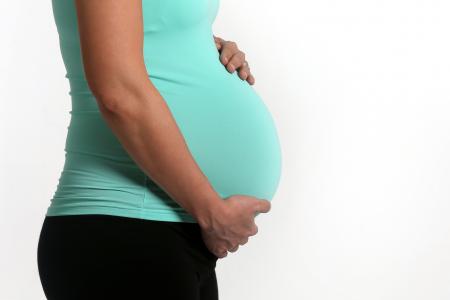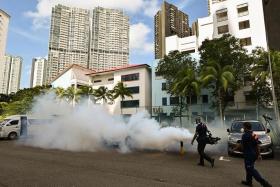Pregnant mum stays put in Zika cluster despite risks
She lives in Aljunied Crescent, which is a Zika cluster, but she is staying put for the time being.
Despite the news that more than 80 people have tested positive for locally transmitted Zika, Ms Mastika Yaacob, who is five months pregnant, is adopting a wait-and-see approach.
The 42-year-old designer has taken extra precautions, such as spraying on mosquito repellent, wearing lemongrass oil and mosquito patches, and closing her doors and windows during the day, but she is also trying to stay calm.
"I have to remind myself not to be overly stressed, although, to be honest, this is quite nerve-racking," said Ms Mastika, who lives in Block 102, where the first known case of locally transmitted Zika was found.
"I smell of lemongrass and insect repellent all the time now, but that isn't a problem to me."
She said her family has been trying to convince her to move to her sister's place in Kembangan until the Zika outbreak is over, but she feels that as long as she takes precautions, she is safe.
She said: "I feel safer here because now, everyone (in the area) is on high alert. The authorities are fogging the place frequently and they're on their toes.
"If I go somewhere else that is not affected by Zika, (the people there) may not take such care."
However, she said she would consider moving if the situation gets worse.
SLEEPLESS NIGHTS
The issue has given her sleepless nights and she worries constantly that her family, especially her 75-year-old mother, will get infected.
"My top priority now is to safeguard my family and my baby, because all it takes is just one bite," she said.
Ms Mastika said that when she found out that the first case had come from her block, she was "utterly shocked" as she never expected the problem to hit so close to home.
When TNP told Ms Mastika that there were pregnant mothers moving out of the affected area and that some were even moving out of the country to avoid the Zika virus, she said: "As a pregnant mother, you can't be complacent, you do what you need to do.
"Mums-to-be have to be kiasu. For me, I just do what I can to fix the situation."
The first-time mum-to-be added: "When you're pregnant, you're extra paranoid about what you eat and do and this (Zika outbreak) doesn't help."
Pregnant woman returns to Germany to avoid Zika
A pregnant woman left on a plane to Germany last night.
The reason for her haste?
The German, who did not wish to be named, is 28 weeks pregnant and does not want to take any chances with the Zika virus here.
The 42-year-old director of an Austrian jewellery company lives in Joo Chiat, near the cluster in Sims Drive and Aljunied Crescent that has seen cases of locally transmitted Zika virus infections.
Since the authorities announced the first case on Saturday, the number of cases has jumped to 82.
The German woman, who came to Singapore in 2012, told The New Paper that it was "very scary" that it takes a while before the virus can be detected in the body and that only 20 per cent of those infected show symptoms.
MAJOR CONCERN
Although Zika does not usually result in death, it is a major concern for expectant mothers because if they are infected with the virus, they are at risk of delivering babies with microcephaly - a rare condition where the baby is born with a small head and this can lead to incomplete brain development and other issues.
The pregnant woman said it was particularly worrying that there was little information about Zika and that studies done on the virus seem incomplete or partly contradict each other.
She said: "If you check for precautions (against Zika), they tell you to put on repellent, buy a mosquito net, wear long sleeves and stay in air-conditioned rooms.
"No vaccination is available and even if (the virus is) detected, there is nothing you can do. Unless you are below 24 weeks pregnant and decide to abort.
"All those indicators are not reassuring at all."
She said she was not content with just taking the usual precautions against Zika and she did not want to take any chances with her baby, which is due in mid-November.
So on Monday night, she and her partner made the decision to fly back to Germany.
She plans to continue working from Germany and will deliver her baby there.
RISK
"I don't want to panic whenever I've been bitten by a mosquito (in Singapore).
"So my partner and I decided that even if there was only a 1 per cent risk of harm to our baby, we didn't want to take that risk," she said.
MP Tin Pei Ling to monitor mums-to-be in her ward
MacPherson MP Tin Pei Ling, whose ward is part of the Zika-affected area in Aljunied Crescent, was out and about yesterday evening, reaching out to pregnant residents.
On Monday, she told The Straits Times that her team was compiling a list of pregnant residents in her ward to monitor their well-being and pass information on to them.
Yesterday, she told The New Paper that she had 20 names on her list, but expected it to grow.
"Although many of them are not from Aljunied Crescent and are from other areas in MacPherson that have not seen locally transmitted Zika cases, we're still putting them on the list," she said.
"But we'll be paying special attention to the pregnant women who live in Aljunied Crescent."
She added that there were seven women from Aljunied Crescent on the list.
Ms Tin said: "If (residents) have a specific question about Zika, we can help facilitate and seek answers from officials. Zika is still something new for us Singaporeans, so we're learning along the way in terms of what we can to do help our residents.
"But for a start, (we're) connecting everyone and making sure we have a channel to share information and updates."
- Additional reporting by Nurul Asyikin Yusoff
What pregnant women should do
The Ministry of Health (MOH) and the Clinical Advisory Group on Zika virus infection and pregnancy advise all pregnant women in Singapore with symptoms of Zika, as well as those with male partners who are Zika-positive, to be tested for Zika virus infection.
This is regardless of whether they have been to Zika-affected areas.
Symptoms of Zika include a fever and rashes, and other signs such as red eyes or joint pains.
Testing for pregnant women as referred by their doctors, and who meet these criteria, is free at public healthcare institutions.
According to the advisory sent out by MOH yesterday, if a pregnant patient is confirmed positive for Zika, she will be referred to a maternal-foetal medicine specialist for counselling and advice.
Obstetricians and gynaecologists may recommend regular ultrasound scans to monitor for foetal growth and abnormalities.
TESTING
MOH will also arrange for the pregnant woman to be admitted to a public hospital for further management and care if necessary.
Amniotic fluid testing for Zika may be offered to the pregnant woman after 15 weeks of pregnancy.
MOH also said it was important to note that a positive Zika test did not mean that the foetus is infected or harmed as the estimated risk of microcephaly associated with the Zika virus infection during pregnancy can vary widely.
Besides preventing mosquito bites through precautionary measures, women with confirmed Zika virus infections should abstain from sexual intercourse for at least eight weeks after recovery.
Men with confirmed Zika virus infections, but whose female partner is not pregnant, should also adopt safe sexual practices.
Pregnant women who are concerned about their pregnancy should consult their doctor for advice.
For more information, visit www.moh.gov.sg/zika
Get The New Paper on your phone with the free TNP app. Download from the Apple App Store or Google Play Store now



